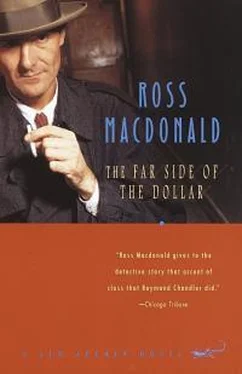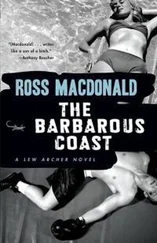“Why would Tom stay with them? They must be – have been outrageous creatures.”
“Teenage boys sometimes go for the outrageous.”
“Do they not,” she said. “But I can’t really blame Tom for anything he’s done. Ralph and I have given him little enough reality to hold on to. Tom’s a sensitive, artistic, introverted boy. My husband didn’t want him to be those things – perhaps they reminded Ralph that he wasn’t our son, really. So he kept trying to change him. And when he couldn’t, he withdrew his interest. Not his love, I’m sure. He’s still profoundly concerned with Tom.”
“But he spends his time with Dick Leandro.”
One corner of her mouth lifted, wrinkling her cheek and eye, as if age and disillusion had taken sudden possession of that side of her face.
“You’re quite a noticer, Mr. Archer.”
“You have to be, in my job. Not that Dick Leandro makes any secret of his role. I met him coming, out of your driveway.”
“Yes. He was looking for Ralph. He’s very dependent on Ralph,” she added dryly.
“How would you describe the relationship, Mrs. Hillman? Substitute son?”
“I suppose I would. Dick’s mother and father broke up some years ago. His father left town, and of course his mother got custody of Dick. He needed a substitute father. And Ralph needed someone to crew for him on the sloop – I sometimes think it’s the most urgent need he has, or had. Someone to share the lusty gusty things he likes to do, and would like a son to do.”
“He could do better than Dick, couldn’t he?”
She was silent for a while. “Perhaps he could. But when you have an urgent need, you tend to hook up with people who have urgent needs of their own. Poor Dick has a great many urgent needs.”
“Some of which have been met. He told me that your husband put him through college.”
“He did. But don’t forget that Dick’s father used to work for Ralph’s firm. Ralph is very strong on loyalty, up and down.”
“Is Dick?”
“He’s fanatically loyal to Ralph,” she said with emphasis.
“Let me ask you a hypothetical question, without prejudice, as they say in court. If your husband disinherited Tom, would Dick be a likely heir?”
“That’s excessively hypothetical, isn’t it?”
“But the answer might have practical consequences. What’s your answer?”
“Dick might be left something. He probably will be in any case. But please don’t imagine that poor stupid Dick, with his curly hair and his muscles, is capable of plotting–”
“I wasn’t suggesting that.”
“And you mustn’t embarrass Dick. He’s come through nobly in this crisis. Both of us have leaned on him.”
“I know. I’ll leave him alone.”
I got up to go. “Thank you for being frank with me.”
“There’s not much point in pretending at this late date. If there’s anything else you need to know–”
“There is one thing that might help. If you could give me the name of the agency through which you adopted Tom?”
“It wasn’t done through an agency. It was handled privately.”
“Through a lawyer, or a doctor?”
“A doctor,” she said. “I don’t recall his name, but he delivered Tom at Cedars of Lebanon. We paid the expenses, you understand, as part of the bargain that we made with the mother.”
“Who was she?”
“Some poor woman who’d got herself in trouble. I didn’t actually meet her, nor did I want to. I wanted to feel that Tom was my own son.”
“I understand.”
“Does it matter who his parents were? I mean, in the current situation?”
“It does if he’s wandering around Los Angeles looking for them. Which I have reason to think he may be doing. You should have a record somewhere of that doctor’s name.”
“My husband could tell you.”
“But he isn’t available.”
“It may be in his desk in the library.”
I followed her to the library and while she rummaged in the desk I looked at the pictures on the wall again. The group photo taken on the flight deck must have been Hillman’s squadron. I looked closely at their faces, wondering which of the young men had died at Midway.
Next I studied the yachting picture of Dick Leandro. His handsome, healthy, empty face told me nothing. Perhaps it would have meaning for somebody else. I took it off the wall and slipped it into the side pocket of my jacket.
Elaine Hillman didn’t notice. She had found the name she was looking for.
“Elijah Weintraub,” she said, “was the doctor’s name.”
I PHONED DR Weintraub long-distance. He confirmed the fact that he had arranged for Thomas Hillman’s adoption, but he refused to discuss it over the phone. I made an appointment to see him in his office that afternoon.
Before I drove back to Los Angeles I checked in with Lieutenant Bastian. He’d been working on the case for nearly three days, and the experience hadn’t improved his disposition. The scarlike lines in his face seemed to have deepened. His voice was hoarse and harsh, made harsher by irony: “It’s nice of you to drop by every few days.”
“I’m working for Ralph Hillman now.”
“I know that, and it gives you certain advantages. Which you seize. But you and I are working on the same case, and we’re supposed to be cooperating. That means periodic exchanges of information.”
“Why do you think I’m here?”
His eyes flared down. “Fine. What have you found out about the Hillman boy?”
I told Bastian nearly all of it, enough to satisfy both him and my conscience. I left out the adoption and Dr. Weintraub, and the possibility that Tom might turn up at the Santa Monica bus station at nine that night. About his other movements, and the fact that he had probably been a voluntary captive in the Barcelona Hotel, I was quite frank.
“It’s too bad Otto Sipe had to die,” Bastian grumbled. “He could have cleared up a lot of things.”
I agreed.
“Exactly what happened to Sipe? You were a witness.”
“He attacked Ben Daly with a spade. Daly was holding my gun while I examined Harley’s body. The gun went off.”
Bastian made a disgusted noise with his lips. “What do you know about Daly?”
“Not much. He has a service station across from the Barcelona. He struck me as dependable. He’s a war veteran–”
“So was Hitler. LA says Daly had previous dealings with Sipe. Sipe bought secondhand cars through him, for instance.”
“That would be natural enough. Daly ran the nearest service station to where Sipe worked.”
“So you don’t think Daly killed him to shut him up?”
“No, but I’ll bear it in mind. I’m more interested in the other killing. Have you seen the knife that Harley was stabbed with?”
“Not yet. I have a description.”
Bastian moved some papers around on top of his desk. “It’s what they call a hunting knife, made by the Oregon firm of Forstmann, with their name on it. It has a broad blade about six inches long, is very sharp and pointed, has a striped rubber handle, black and white, with finger moldings on it. Practically brand new. Is that an accurate description?”
“I only saw the striped rubber handle. The fact that the blade is quite broad, sharp, and pointed suggests that it’s the same knife that stabbed Carol.”
“So I told LA they’re going to send me the knife for identification work.”
“That’s what I was going to suggest.”
Bastian leaned forward, bringing his arms down heavily among the papers on his desktop. “You think somebody in town here stabbed him?”
“It’s an idea worth considering.”
“Why? For his share of the money?”
“It couldn’t have been that. Harley had nothing left by the time he left Las Vegas. I talked to the high-roller who cleaned him out.”
Читать дальше












